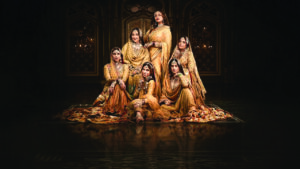Courtesans in Lahore, pre-partition, played multifaceted roles in society. They were skilled entertainers, dancers, singers, and often intellectuals, providing companionship, entertainment, and sometimes even political influence to their patrons. They were also patrons of the arts themselves, nurturing poetry, music, and dance. Their sensitivity to human emotions, sensibility in artistic expression, and sensuality in their performances created an atmosphere that transcended mere entertainment, offering a deeper connection to the human experience. Additionally, they served as intermediaries between different social classes and were sometimes involved in diplomacy and espionage. Overall, they were integral to the cultural and social fabric of Lahore during that era.
They like other artists and intellectuals, had subtle yet significant participation in the freedom movement. Through their social connections and influence, they often facilitated discussions about political ideas, contributing to the spread of nationalist sentiments. Some courtesans used their performances and gatherings as platforms to subtly convey messages of resistance and patriotism. Additionally, their interactions with politicians, intellectuals, and other influential figures allowed them to provide support to the freedom movement behind the scenes, whether through financial contributions, information sharing, or networking. While their involvement may not have been overt, their presence and influence were nonetheless impactful in shaping the sentiments of the time.
Though questionable by society ; the strength of character exhibited by courtesans was indeed remarkable, despite facing societal scrutiny and stigma. They navigated a complex social landscape with grace, intelligence, and resilience. Many of them defied traditional gender roles and societal expectations by asserting their independence, pursuing their passions, and challenging norms. Their ability to thrive in such circumstances speaks to their remarkable strength of character, determination, and adaptability. While society may have questioned their choices and lifestyle, their inner strength and resilience allowed them to carve out their own identities and make significant contributions to art, culture, and the social setup of the time .
As we are aware that courtesans in Lahore were often highly trained in classical dance and music, adhering to the traditional values of parampara (lineage) with eloquence and dedication. They were custodians of classical arts, preserving and passing down centuries-old traditions through rigorous training and practice. Despite the social stigma associated with their profession, many courtesans maintained a deep reverence for the classical arts, upholding the principles of parampara with utmost sincerity. Their mastery of dance and music not only showcased their artistic prowess but also served as a testament to their commitment to preserving cultural heritage. Through their performances, they enriched the cultural landscape of Lahore and beyond, leaving a lasting legacy that continues to inspire generations.

The operative nature of their establishment provided employment for a diverse range of craftsmanship, supporting artisans and craftsmen from various fields. These craftsmen were involved in creating intricate costumes, jewelry, musical instruments, stage props, and other accessories required for the courtesans’ performances and lifestyle. Tailors, embroiderers, jewelry makers, instrument makers, painters, and many other artisans found employment through their patronage. Additionally, courtesans often hosted lavish gatherings and events, which required the services of caterers, decorators, florists, and other service providers. Thus, their patronage had a significant ripple effect on the local economy, providing livelihoods for numerous craftsmen and artisans in Lahore and beyond. Not to forget the ‘ tanga ‘ , buggies (extravagant horse carriages )
All in all, the socio-political place of courtesans in history deserves recognition and respect.
Despite facing societal stigma and marginalization, courtesans wielded significant influence in the cultural, social, and political spheres of their time. Their patronage of the arts, their role as intermediaries between different social classes, and their subtle participation in political movements all contributed to shaping the fabric of society. Moreover, courtesans often provided a platform for intellectual discourse and artistic expression, fostering creativity and innovation.
Their contributions to literature, music, dance, and other forms of art enriched the cultural heritage of Lahore and beyond. Furthermore, their interactions with politicians, intellectuals, and other influential figures allowed them to exert subtle yet meaningful influence on socio-political developments.
Therefore, acknowledging and honoring the socio-political place of courtesans in history is essential for a comprehensive understanding of the past and for appreciating the diverse contributions of individuals from all walks of life. They were definitely the nurturers and had the deepest understanding of what liberty and freedom meant in the true sense of the word.
A review on the depiction of the life of the courtesans in Sanjay Leela Bhansali Netflix series ‘Heera Mandi ’







